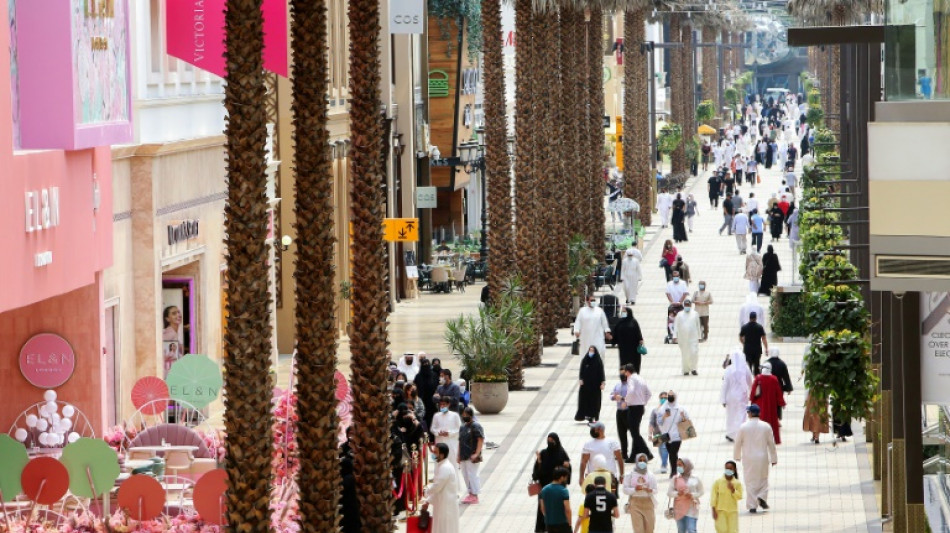
-
 EU warns Meta it must open up WhatsApp to rival AI chatbots
EU warns Meta it must open up WhatsApp to rival AI chatbots
-
Scotland spoil Italy's T20 World Cup debut with big win

-
 Israeli president says 'we will overcome evil' at Bondi Beach
Israeli president says 'we will overcome evil' at Bondi Beach
-
Munsey leads Scotland to 207-4 against Italy at T20 World Cup

-
 Japan restarts world's biggest nuclear plant again
Japan restarts world's biggest nuclear plant again
-
Bangladesh poll rivals rally on final day of campaign

-
 Third impeachment case filed against Philippine VP Duterte
Third impeachment case filed against Philippine VP Duterte
-
Wallaby winger Nawaqanitawase heads to Japan

-
 Thailand's Anutin rides wave of nationalism to election victory
Thailand's Anutin rides wave of nationalism to election victory
-
Venezuela's Machado says ally kidnapped by armed men after his release

-
 Maye longs for do-over as record Super Bowl bid ends in misery
Maye longs for do-over as record Super Bowl bid ends in misery
-
Seahawks' Walker rushes to Super Bowl MVP honors

-
 Darnold basks in 'special journey' to Super Bowl glory
Darnold basks in 'special journey' to Super Bowl glory
-
Japan's Takaichi may struggle to soothe voters and markets

-
 Seahawks soar to Super Bowl win over Patriots
Seahawks soar to Super Bowl win over Patriots
-
'Want to go home': Indonesian crew abandoned off Africa demand wages

-
 Asian stocks track Wall St rally as Tokyo hits record on Takaichi win
Asian stocks track Wall St rally as Tokyo hits record on Takaichi win
-
Bad Bunny celebrates Puerto Rico in joyous Super Bowl halftime show

-
 Three prominent opposition figures released in Venezuela
Three prominent opposition figures released in Venezuela
-
Israeli president says 'we shall overcome this evil' at Bondi Beach

-
 'Flood' of disinformation ahead of Bangladesh election
'Flood' of disinformation ahead of Bangladesh election
-
Arguments to begin in key US social media addiction trial

-
 Dr. Jonathan Spages Expands Diabetes Reversal Practice Across New States, Adds Clinical Team to Meet Growing Demand
Dr. Jonathan Spages Expands Diabetes Reversal Practice Across New States, Adds Clinical Team to Meet Growing Demand
-
Agronomics Limited Announces Net Asset Value Calculation as at 31 December 2025

-
 UK-Based Vesalic Limited Emerges from Stealth with Landmark Discovery of Potential Non-CNS Driver of Motor Neuron Diseases, including ALS, and Breakthrough Therapeutic and Diagnostic Opportunities
UK-Based Vesalic Limited Emerges from Stealth with Landmark Discovery of Potential Non-CNS Driver of Motor Neuron Diseases, including ALS, and Breakthrough Therapeutic and Diagnostic Opportunities
-
Gotterup tops Matsuyama in playoff to win Phoenix Open

-
 New Zealand's Christchurch mosque killer appeals conviction
New Zealand's Christchurch mosque killer appeals conviction
-
Leonard's 41 leads Clippers over T-Wolves, Knicks cruise

-
 Trump says China's Xi to visit US 'toward the end of the year'
Trump says China's Xi to visit US 'toward the end of the year'
-
Real Madrid edge Valencia to stay on Barca's tail, Atletico slump

-
 Malinin keeps USA golden in Olympic figure skating team event
Malinin keeps USA golden in Olympic figure skating team event
-
Lebanon building collapse toll rises to 9: civil defence

-
 Real Madrid keep pressure on Barca with tight win at Valencia
Real Madrid keep pressure on Barca with tight win at Valencia
-
PSG trounce Marseille to move back top of Ligue 1

-
 Hong Kong to sentence media mogul Jimmy Lai in national security trial
Hong Kong to sentence media mogul Jimmy Lai in national security trial
-
Lillard will try to match record with third NBA 3-Point title

-
 Vonn breaks leg as crashes out in brutal end to Olympic dream
Vonn breaks leg as crashes out in brutal end to Olympic dream
-
Malinin enters the fray as Japan lead USA in Olympics team skating

-
 Thailand's Anutin readies for coalition talks after election win
Thailand's Anutin readies for coalition talks after election win
-
Fans arrive for Patriots-Seahawks Super Bowl as politics swirl

-
 'Send Help' repeats as N.America box office champ
'Send Help' repeats as N.America box office champ
-
Japan close gap on USA in Winter Olympics team skating event

-
 Liverpool improvement not reflected in results, says Slot
Liverpool improvement not reflected in results, says Slot
-
Japan PM Takaichi basks in election triumph

-
 Machado's close ally released in Venezuela
Machado's close ally released in Venezuela
-
Dimarco helps Inter to eight-point lead in Serie A

-
 Man City 'needed' to beat Liverpool to keep title race alive: Silva
Man City 'needed' to beat Liverpool to keep title race alive: Silva
-
Czech snowboarder Maderova lands shock Olympic parallel giant slalom win

-
 Man City fight back to end Anfield hoodoo and reel in Arsenal
Man City fight back to end Anfield hoodoo and reel in Arsenal
-
Diaz treble helps Bayern crush Hoffenheim and go six clear


'Great misery': Kuwait political crisis drags down economy
A seemingly never-ending political crisis is plunging oil-rich Kuwait's economy into the mire, affecting basic services and causing mounting public concern.
Despite its large oil reserves, hospitals and educational services are in decay as squabbling paralyses the wealthy Gulf region's only fully elected parliament.
Ahmed al-Sarraf, a businessman and newspaper columnist, says his concerns are growing as the country falters.
"I feel great anxiety for my family, for the future of my grandchildren, for their education, and for my health," the former banker told AFP.
"This situation is generating great misery."
Kuwait, which borders Saudi Arabia and Iraq, is home to seven percent of the world's crude reserves. It has little debt and one of the strongest sovereign wealth funds worldwide.
However, it suffers from constant stand-offs between elected lawmakers and cabinets installed by the ruling Al-Sabah family, which maintains a strong grip over political life, despite a parliamentary system in place since 1962.
The stasis has prevented lawmakers from passing reforms to diversify the economy, while repeated budget deficits and low foreign investment have added to the air of gloom.
The latest twist came last month, when the constitutional court dissolved an opposition-controlled assembly over alleged electoral irregularities and reinstated the previous parliament.
- 'Political dysfunction' -
Kuwait's parliament has now been dissolved around a dozen times in its 61-year history.
In January, Kuwait's government resigned three months after it was sworn in due to disputes with lawmakers. It was the sixth government in just three years.
Kuwait's neighbours the UAE, Saudi Arabia and Qatar have managed to transform their desert nations into booming modern metropolises, largely thanks to oil wealth and foreign investment.
Led by a new generation of rulers, they are stepping up projects to wean their hydrocarbon-centred economies away from oil.
Meanwhile Kuwait, led by 82-year-old Crown Prince Mishal al-Ahmad al-Jaber Al-Sabah, is struggling to implement a reform plan adopted in 2018.
"We were a liberal and innovative country in the 1980s... but we died out while the countries around us developed," the businessman Sarraf said.
According to economist Justin Alexander, "political dysfunction" has kept Kuwait from living up to its full economic potential.
The paralysis "has prevented it from taking painful reforms to control spending growth, generate non-oil revenue, diversify its economy or even invest to maintain its oil production capacity," the Gulf expert said.
Kuwait, which posted large deficits during the Covid-19 pandemic, was buoyed last year by the rise in oil prices, which generate most of the state's income.
But as prices stabilise, the country's budget deficit is expected to widen.
- Kuwait 'needs a reset' -
In January, the caretaker cabinet submitted a draft 2023-2024 budget that projected a deficit of five billion dinars (more than $16 billion) for the year starting in April.
That compares with a 1.35-billion-dinar surplus expected for the current year, according to Bloomberg.
Before Kuwait's last cabinet resigned in January, it had promised to tackle state spending and fight corruption.
It stepped down to outmanoeuvre lawmakers who were pressing ministers to pass a costly debt relief bill that would grant a debt amnesty for Kuwaiti citizens.
Kuwait "has a governance crisis", said researcher Kristin Diwan, of the Arab Gulf States Institute in Washington.
This is "apparent in systemic malaise, in failures of planning and in mounting social woes", including over the deterioration of public services, the expert said.
While politicians squabble, Kuwaiti citizens are paying the price, said Bader al-Saif, assistant professor of history at Kuwait University.
The "Kuwaiti street is exhausted," he said on Twitter, decrying a "perpetual impasse".
"Kuwait's politics needs a reset," Saif added, calling for a national dialogue and a new constitution.
M.A.Colin--AMWN



